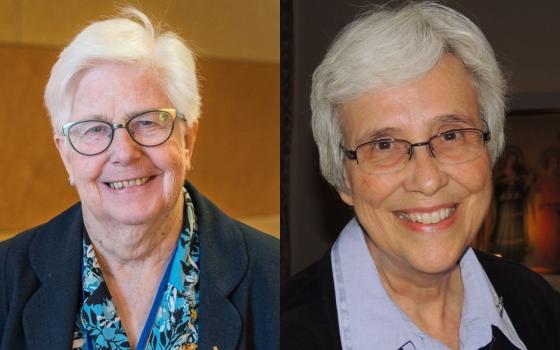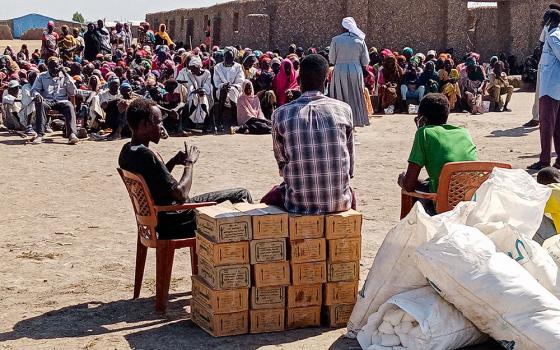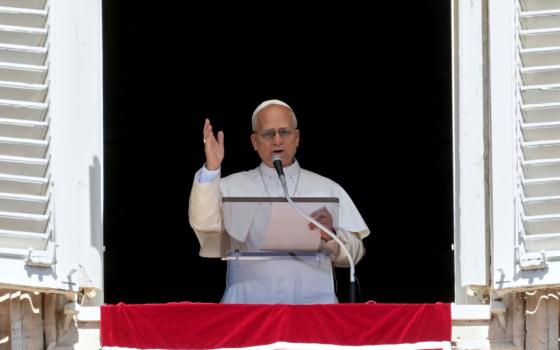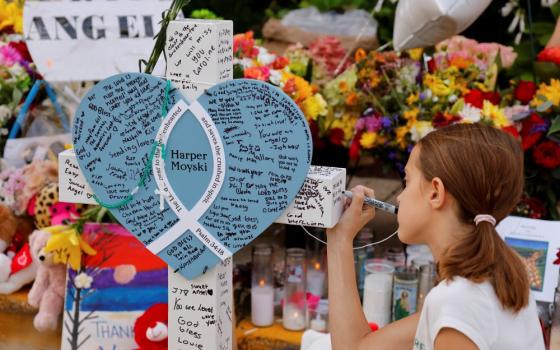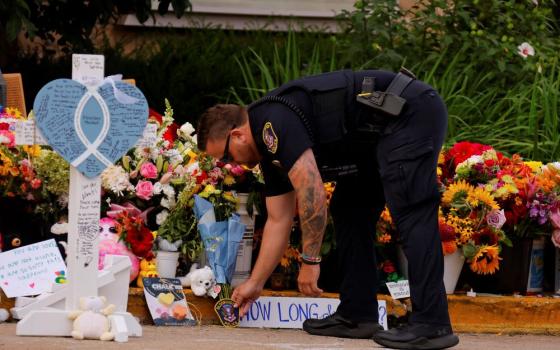Irena Saszko presents at the training session for sisters at the Institute of Theological Sciences Horodok, Ukraine. The institute partnered with other organizations to provide psychological and pastoral training on post-traumatic disorders and working with children in wartime conditions for nuns in Ukraine. (Courtesy of Irena Saszko)
Just two years ago, it was hard to imagine that Pope Francis' metaphor of the church as "a field hospital after battle" would directly relate to Ukraine. When in 2014 the hybrid war of the Russian Federation against the Ukrainian people began, His Holiness initiated the humanitarian campaign "Pope for Ukraine." Catholic and Orthodox priests, as well as Protestant pastors of various denominations, set off to the eastern part of the country to provide spiritual and psychological support to the military and civilians living on the front line. However, since Feb. 24, 2022, Ukraine has become one large, bleeding wound.
In September 2022, the Ministry of Health of Ukraine, for the first time since the beginning of the full-scale war, published the results of a comprehensive examination of the mental state of the population. Based on these results, experts predict that nearly 15.7 million people in Ukraine will need psychological assistance, and over 4 million are expected to grapple with mental disorders such as depression, neuroses and obsessive-compulsive disorders. According to the Ministry of Health, by fall 2022, more than 25% of Ukraine's population already suffered from severe anxiety disorders, depression and various types of addictions caused by post-traumatic stress disorder due to the war. Clearly, these figures will only increase. The daily onslaught of rocket attacks, information about the dead and wounded, as well as the need to leave one's place of residence dramatically affect the mental and spiritual health of citizens.
It is precisely because of this that the church in Ukraine recognizes its urgent calling to be a real field hospital where everyone in need can receive urgent assistance and support. The spiritual care of the church encompasses all strata of society, but primarily the military, their families, friends, relatives, direct victims of war and refugees. There is strong indication that this support will continue in the long term.
The church in Ukraine has become a true field hospital — a place dedicated to dressing wounds and alleviating suffering.
Among the clergy and believers, various initiatives are being launched to support those affected by the Russian Federation's invasion of Ukraine. Individual psychologists on a voluntary basis visit military hospitals or families of fallen soldiers. Priests, monks and nuns also participate in these efforts, driven by the desire and strength to personally encounter human suffering. As the Apostle Paul taught: "Bear one another's burdens, and thereby fulfill the law of Christ" (Galatians 6:2). However, clergy and consecrated people themselves need appropriate knowledge and skills, recognizing that those who have experienced the hell of combat require a special approach.
Deeply aware of the challenges before us, Bishop Mykola Luchok, the ordinary of Ukraine's Mukachevo Diocese, initiated special prayer training sessions for healing and inner liberation for priests and consecrated persons based on the model of the five keys of Neal Lozano. This is a special type of conversation and prayer designed for people suffering from traumatic experiences and lack of forgiveness. The purpose of these courses is not only to help spiritual individuals find peace of heart in challenging wartime circumstances but also to equip them with the appropriate tools to help people who turn to them for assistance.
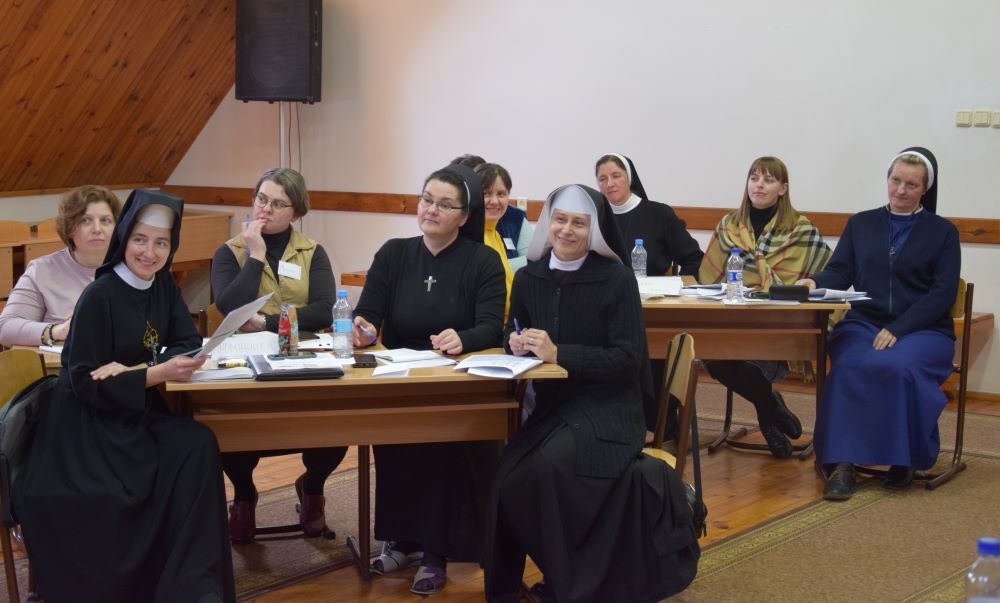
A group listens during a session on psychological and pastoral training for sisters at the Institute of Theological Sciences in Horodok, Ukraine. Ukraine has become "one large, bleeding wound" since Russia began the war on Feb. 24, 2022, Irena Saszko writes. (Courtesy of Irena Saszko)
From Oct. 16 to 20, the Institute of Theological Sciences of the Immaculate Virgin Mary in the city of Horodok, together with the Conference of Superior Sisters of Women's Institutes of Consecrated Life and the Society of Apostolic Life of the Roman Catholic Church in Ukraine, organized a psychological-pastoral training on post-traumatic disorders and working with children in wartime conditions for nuns. Over the weekend, the sisters engaged in intensive sessions with psychologists and psychotherapists, who provided insights into the psychology of trauma. The experts also taught sisters how to provide initial psychological aid to those who have experienced suffering or the death of their loved ones.
Consecrated women also participated in a series of theological lectures on suffering and death based on the teaching of the fathers of the church. Furthermore, they learned to conduct catechesis on the meaning of human life and death for children of different age groups. This is especially important as now every class includes children who have lost a loved one due to war, come from families with war veterans or wounded, or whose homes have been destroyed as a result of rocket attacks.
Advertisement
It is heartening that the sisters expressed a desire for this individualized training to grow into established, systematic training, and they have already planned upcoming meetings. After all, our parishes, prayer communities, rehabilitation centers or groups providing psychological or spiritual support require as many experienced spiritual leaders and facilitators of support groups as possible.
The church in Ukraine has become a true field hospital — a place dedicated to dressing wounds and alleviating suffering. At the same time, the church in Ukraine does not stop asking itself: What does it mean to be a field hospital today? Is it genuinely a hospitable house where Jesus — the Good Samaritan — can bring all those suffering in body and soul (Luke 10:25-37)? Can people of the church, especially during wartime, bear witness to living relationships with Christ, dispel doubts, answer difficult existential questions (such as those concerning the meaning of life and death, evil and suffering), and provide support in faith, hope and love, while showing tenderness and understanding? These questions remain a test of conscience for us. After all, the truth is that the victims of war in their dramatic situation need Jesus and his good news of salvation the most.

